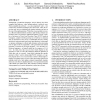Free Online Productivity Tools
i2Speak
i2Symbol
i2OCR
iTex2Img
iWeb2Print
iWeb2Shot
i2Type
iPdf2Split
iPdf2Merge
i2Bopomofo
i2Arabic
i2Style
i2Image
i2PDF
iLatex2Rtf
Sci2ools
113
click to vote
DAC
2009
ACM
2009
ACM
Context-sensitive timing analysis of Esterel programs
Traditionally, synchronous languages, such as Esterel, have been compiled into hardware, where timing analysis is relatively easy. When compiled into software ? e.g., into sequential C code ? very conservative estimation techniques have been used, where the focus has only been on obtaining safe timing estimates and not on the cost of the implementation. While this was acceptable in avionics, efficient implementations and hence tight timing estimates are needed in more cost-sensitive application domains. Lately, a number of advances in Worst-Case Execution Time (WCET) analysis techniques, coupled with the growing use of software in domains such as automotives, have led to a considerable interest in timing analysis of code generated from Esterel specifications. In this paper we propose techniques to obtain tight estimates on the processing time of input events by sequential C code generated from Esterel programs. Execution of an Esterel program ? as in all other synchronous languages ? ...
DAC 2009 | Design Automation | Safe Timing Estimates | Tight Timing Estimates | Tight Wcet Estimates |
Related Content
| Added | 12 Nov 2009 |
| Updated | 12 Nov 2009 |
| Type | Conference |
| Year | 2009 |
| Where | DAC |
| Authors | Lei Ju, Bach Khoa Huynh, Samarjit Chakraborty, Abhik Roychoudhury |
Comments (0)

